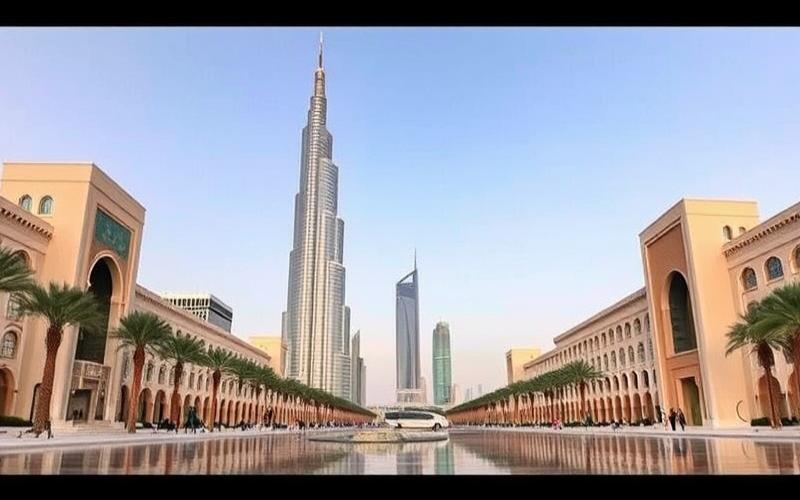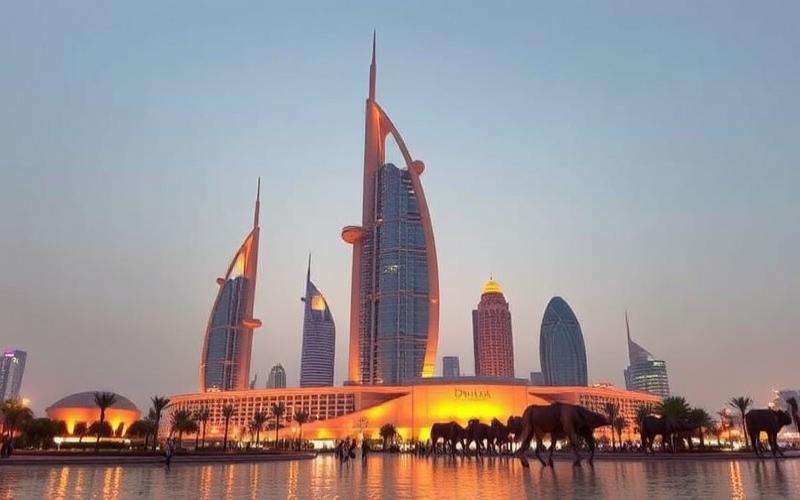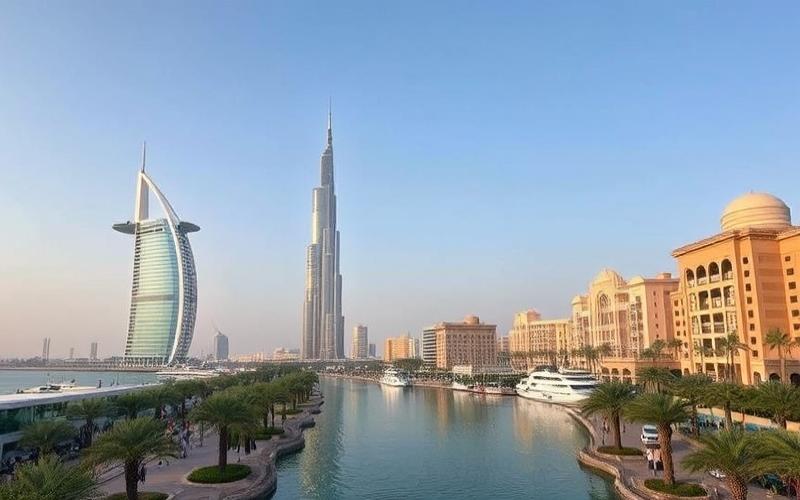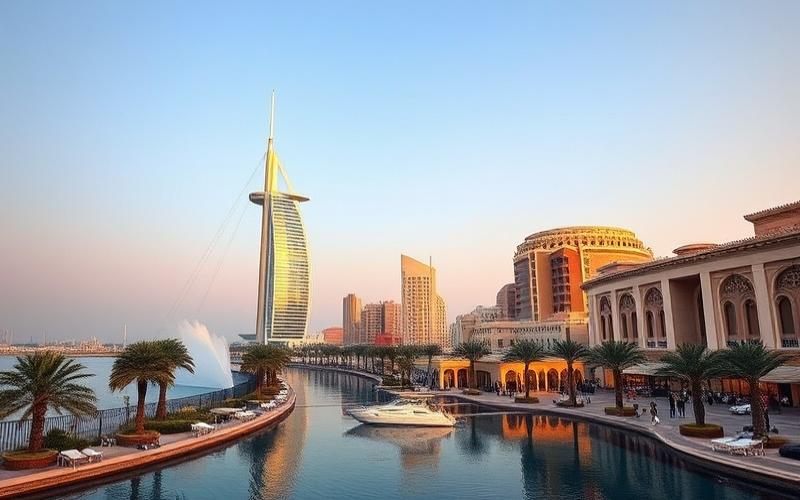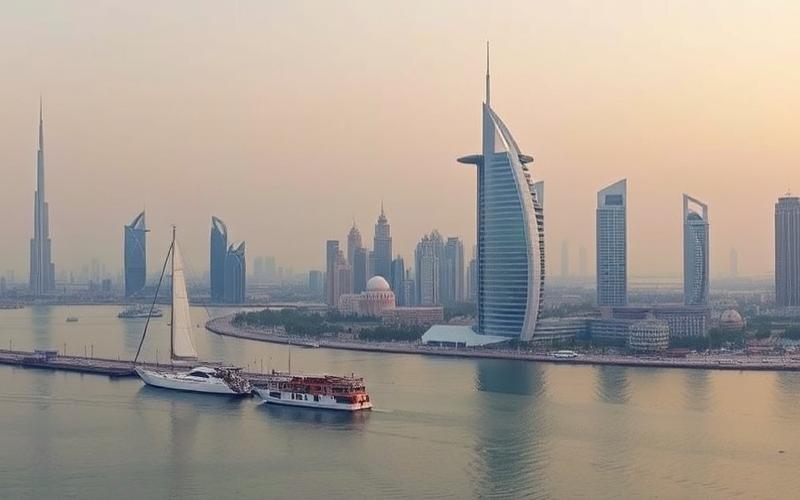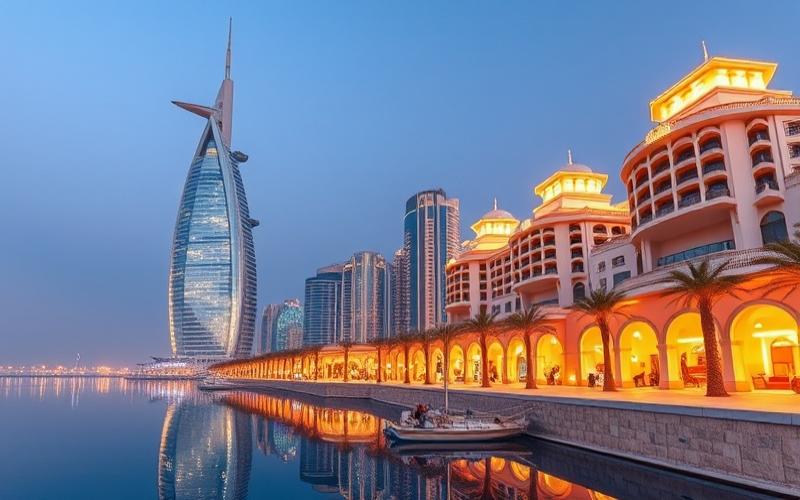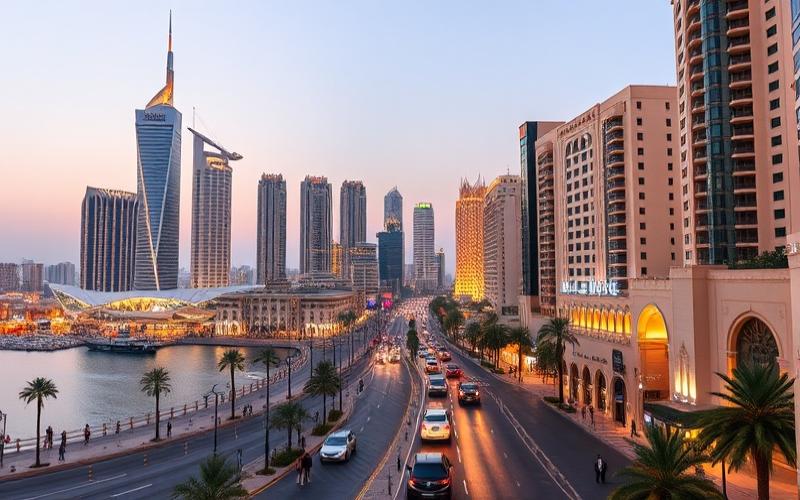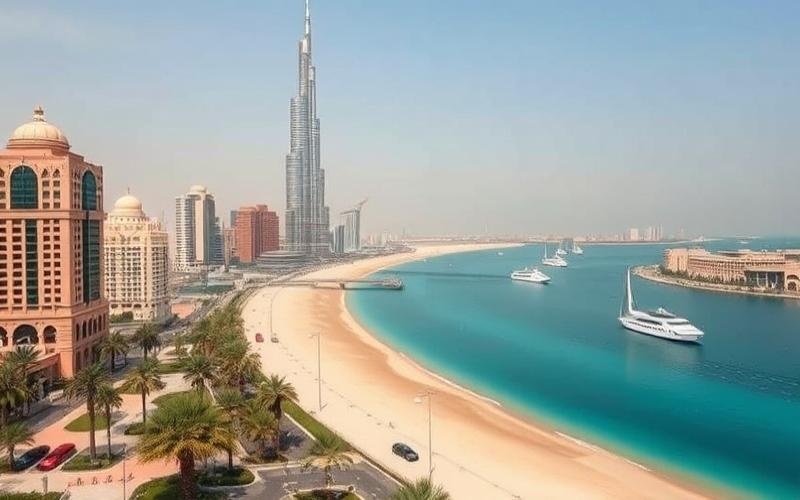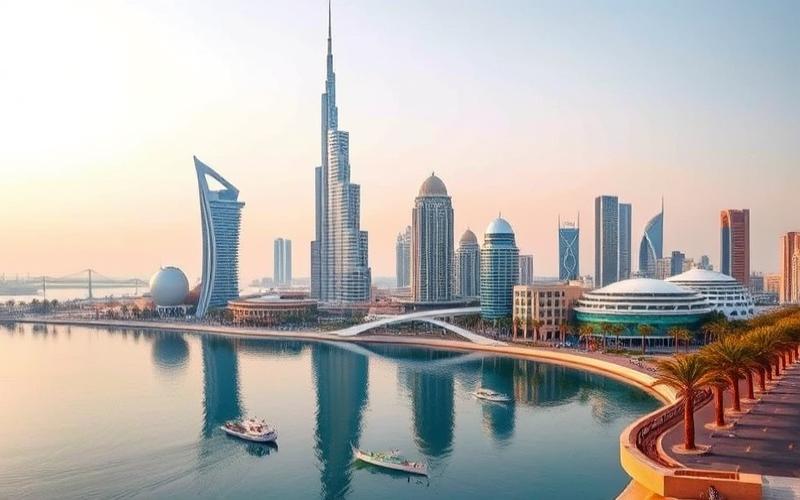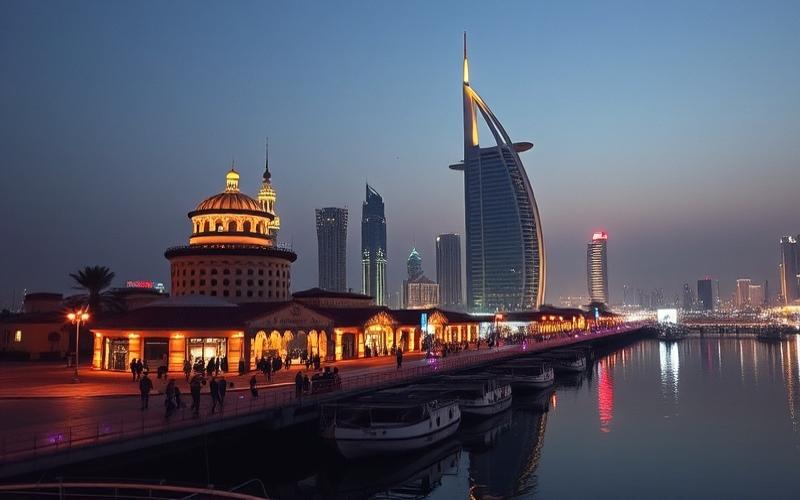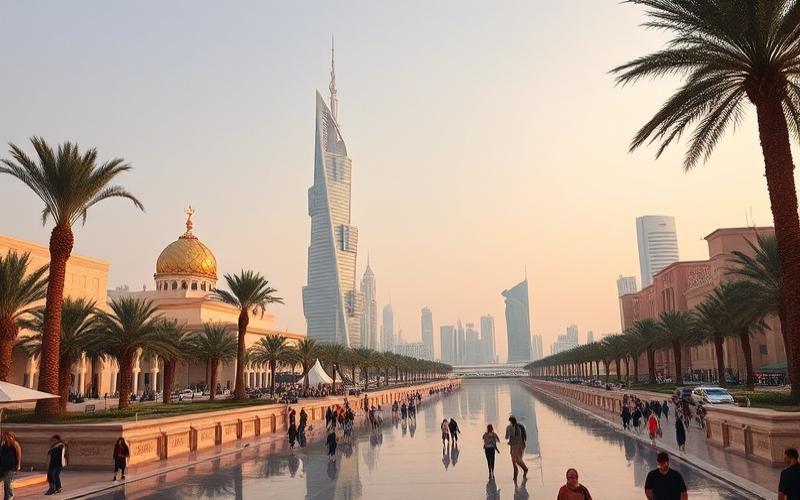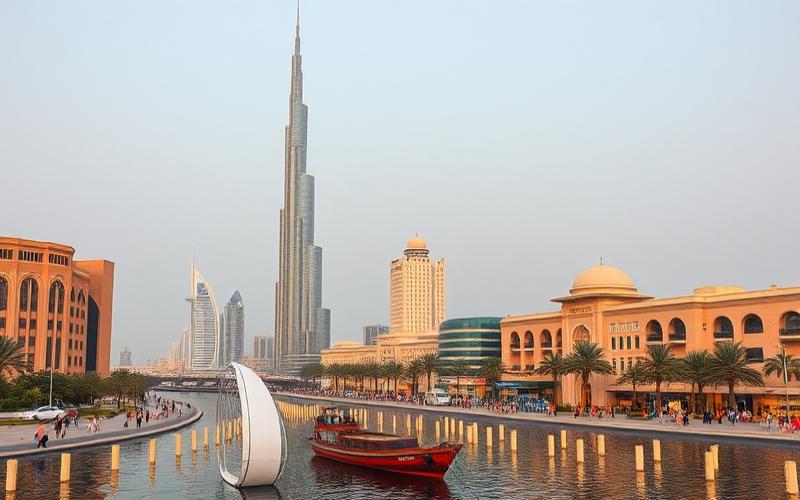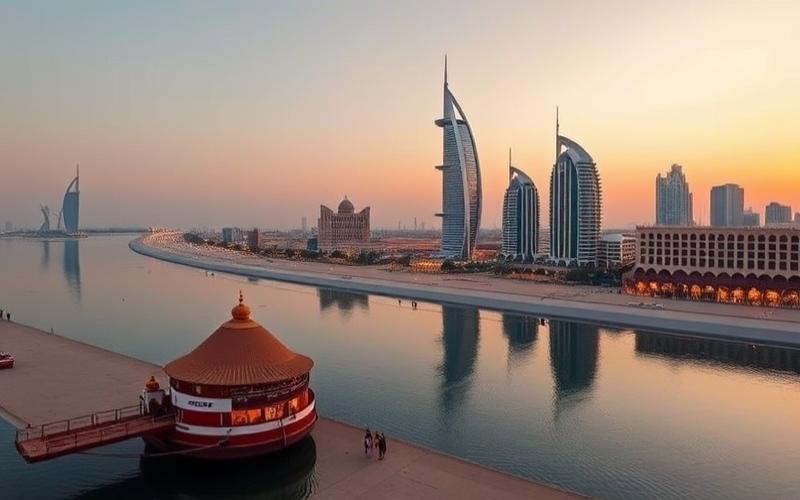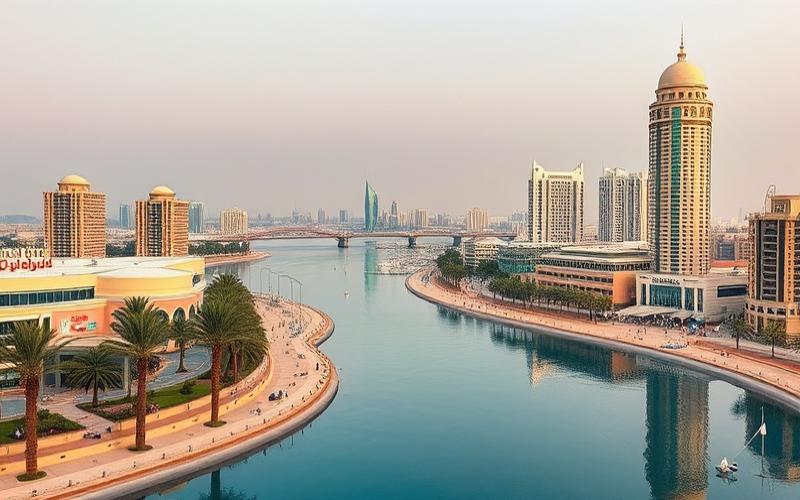
 Published on and written by Cyril Jarnias
Published on and written by Cyril Jarnias
Dubai real estate is attracting more and more international investors, drawn by the profitability prospects and quality of life offered by this dynamic metropolis. However, diving into property purchase in the emirate without proper preparation can prove risky. Many investors make mistakes that can jeopardize their project and lead to significant financial losses. To help you make a successful real estate investment in Dubai, here is a detailed guide to common mistakes to avoid and tips for navigating around them.
Failing to Conduct Thorough Market Research: The Risk of Blind Purchase
One of the most common mistakes when buying property in Dubai is rushing in without conducting thorough market research. The emirate’s real estate market is complex and constantly evolving, with significant disparities between different neighborhoods and property types. Not taking the time to analyze market trends, price per square foot, and growth prospects can lead to an unprofitable investment or even financial loss.
To avoid this trap, it’s crucial to dedicate time to studying the Dubai real estate market. This involves researching different neighborhoods, their characteristics, and their development potential. It’s also important to analyze data on sales and rental prices, as well as occupancy rates in areas that interest you. Real estate reports published by reputable agencies like Knight Frank or JLL can provide valuable market trend insights.
Additionally, consulting with local real estate professionals who know the Dubai market well is recommended. Their expertise can help you identify the most promising investment opportunities and avoid overvalued or declining areas.
Good to Know:
Thorough market research typically takes between 3 and 6 months. This upfront time investment can save you thousands of dirhams and ensure a safer, more profitable investment.
Underestimating Hidden Costs: Beware of Financial Surprises
Another common pitfall for foreign investors in Dubai is underestimating additional costs associated with property purchase. Beyond the property’s purchase price, numerous fees add up and can represent a significant amount if not properly anticipated. These costs include:
- Property transfer fees (4% of sale price)
- Real estate agency fees (typically 2% of sale price)
- Notary and registration fees
- Annual maintenance fees (for condominium apartments)
- Municipal taxes
- Insurance fees
It’s crucial to account for all these costs in your overall budget. According to estimates, these additional fees can represent between 8% and 12% of the property’s purchase price. Not anticipating them can seriously compromise your financing plan and put you in financial difficulty.
To avoid this mistake, establish a detailed budget including all potential costs. Don’t hesitate to consult a financial advisor specializing in Dubai real estate to ensure you haven’t overlooked anything. Some developers offer packages that include some of these fees, which can be advantageous if buying off-plan.
Good to Know:
Plan for a safety margin of at least 10% above your initial budget to handle unexpected expenses and potential cost fluctuations.
Neglecting Legal Aspects: A Legal Risk Not to Be Taken Lightly
The legal framework for real estate in Dubai may seem complex to foreign investors, which is precisely why it’s dangerous to neglect it. Unfamiliarity with local laws and regulations can expose you to significant legal risks and potentially costly consequences. Common mistakes in this area include:
- Not verifying the property’s legal status (freehold, leasehold, etc.)
- Ignoring restrictions related to certain areas or property types
- Not ensuring the legality of sales documents
- Neglecting contract clauses, especially for off-plan purchases
To avoid these legal pitfalls, it’s strongly recommended to hire a lawyer specializing in Dubai real estate. This professional can review all legal documents, verify transaction compliance, and advise you on your rights and obligations as a foreign buyer.
It’s also crucial to understand the different types of properties available in Dubai. For example, “freehold” properties offer full ownership to foreigners, while “leasehold” properties are subject to restrictions. Make sure you understand these distinctions before committing.
Finally, if buying off-plan, be particularly vigilant about contract clauses regarding delivery timelines, penalties for delays, and developer guarantees. These elements can significantly impact your long-term investment.
Good to Know:
The Dubai Land Department (DLD) offers a property title verification service. Use it systematically to ensure the legality of the property you’re considering purchasing.
Choosing the Wrong Location: The Mistake That Can Sink Your Investment
The adage “location, location, location” is particularly true in Dubai, where neighborhood choice can make all the difference between a successful investment and a costly failure. Neglecting location importance or relying solely on aesthetic criteria without considering practical and economic aspects is a common mistake among novice investors.
Dubai is a constantly evolving city, with new neighborhoods emerging regularly. Some areas that seem attractive today might lose their appeal in a few years, while others currently under development could become future real estate hot spots.
To make the right choice, it’s essential to consider several factors:
- Proximity to public transportation (especially the Dubai Metro)
- Accessibility to main business districts and tourist attractions
- Presence of infrastructure and services (schools, hospitals, shopping centers)
- Future development projects in the area
- The neighborhood’s demographic profile
For example, neighborhoods like Dubai Marina, Downtown Dubai, or Palm Jumeirah are safe bets for their central location and developed infrastructure. However, they’re also among the most expensive. Developing areas like Dubai South or Meydan City might offer better value for money and interesting long-term growth potential.
Don’t hesitate to visit the neighborhood that interests you multiple times, at different times of day and week, to get an accurate sense of its atmosphere and quality of life. Also research urban planning projects planned for the area, as they can significantly impact your property’s future value.
Good to Know:
Dubai’s free zones, like Dubai Internet City or Dubai Media City, can offer interesting opportunities for rental investment due to high housing demand from expatriate professionals working there.
Relying Solely on Advertised Rental Yield: Beware of Misleading Promises
In their quest for profitability, many investors are seduced by promises of high rental yields, sometimes unrealistic. Blindly trusting figures announced by developers or real estate agents without independent verification is a mistake that can lead to major disappointments.
It’s important to understand that advertised rental yields are often optimistic projections based on ideal market conditions. In reality, several factors can affect your investment’s actual profitability:
- Vacancy periods between tenants
- Property management and maintenance fees
- Rental market fluctuations
- Potential rent reductions to remain competitive
- Rent defaults
To avoid this trap, it’s crucial to do your own profitability calculations based on realistic data. Consult recent real estate reports to know average yield rates in different Dubai neighborhoods. For example, according to Knight Frank’s Q1 2025 report, average rental yields in Dubai range between 5% and 7% depending on areas, with peaks at 8% in some emerging neighborhoods.
Don’t hesitate to ask for concrete proof of advertised yields, such as rental histories for similar properties in the same area. Also account for all costs associated with renting (management fees, taxes, insurance) to calculate your actual net yield.
Finally, consider diversifying your investment by purchasing several smaller units rather than one large property. This strategy can help spread risks and maintain a more stable income flow.
Good to Know:
Dubai’s rental market is cyclical and can experience significant fluctuations. Plan a safety margin in your profitability calculations to absorb potential rent decreases during slow periods.
Ignoring Cultural and Regulatory Specificities: A Costly Misstep
Dubai is a cosmopolitan city, but it remains rooted in strong local culture and traditions. Ignoring these cultural and regulatory specificities can lead to misunderstandings, delays in your procedures, or even legal problems. This mistake is particularly common among Western investors accustomed to different practices.
Among important cultural and regulatory aspects to consider are:
- Respect for the Islamic calendar, especially during Ramadan
- Restrictions on alcohol consumption and public behavior
- Specific rules regarding renting to singles or unmarried couples
- Construction and layout standards specific to Dubai
- Administrative procedures that may seem complex or unusual
To avoid these pitfalls, it’s essential to familiarize yourself with local culture and customs before diving into real estate investment in Dubai. Take time to research local business practices, codes of conduct, and communication expectations.
It’s also crucial to understand Dubai’s real estate regulatory framework. For example, know that since 2023, foreign owners must obtain a “Golden Visa” to purchase property valued over 2 million dirhams (approximately $545,000). This measure aims to attract wealthy investors and stabilize the real estate market.
Don’t hesitate to engage local professionals (real estate agents, lawyers, tax advisors) who can guide you through procedures and help you navigate the local system. Their expertise can prove invaluable in avoiding misunderstandings and costly errors.
Good to Know:
The Dubai Land Department offers free information sessions for foreign investors, covering legal and cultural aspects of real estate investment in Dubai. Take advantage of these resources to familiarize yourself with the local context.
Neglecting Due Diligence Importance: A Carelessness That Can Cost Dearly
“Due diligence” is a crucial process in any real estate investment, but it’s often neglected or rushed by impatient or overconfident investors. Not conducting thorough due diligence can expose you to significant risks, ranging from undetected structural problems to costly legal disputes.
Due diligence in Dubai real estate context involves several aspects:
- Verifying legality and authenticity of all property-related documents
- Detailed technical inspection of the property (for existing properties)
- Verifying developer’s financial strength (for off-plan purchases)
- Analyzing usage restrictions and potential easements
- Reviewing existing rental contracts (for already rented properties)
To successfully complete this process, hiring qualified professionals is recommended. A real estate specialized lawyer can examine all legal aspects of the transaction. An independent building inspector can assess the property’s condition and identify potential structural or maintenance issues.
If buying off-plan, be particularly vigilant about the developer’s reputation and financial strength. Check their track record, previous projects, and ability to deliver on time. The Dubai Land Department maintains a register of approved developers you can consult.
Don’t hesitate to ask questions and request clarifications on all aspects that seem unclear or concerning. A good-faith seller or developer will have no problem answering your queries and providing necessary documents.
Good to Know:
Since 2024, the Dubai Land Department has implemented a real estate developer rating system based on their delivery history and customer satisfaction. Consult these ratings to gauge the reliability of developers you’re considering working with.
Rushing the Purchase: Patience is Key to Good Investment
In a dynamic market like Dubai’s, it can be tempting to rush to seize what seems like a good opportunity. However, acting hastily is one of the most common and potentially costly mistakes in real estate investment. This rush can lead to neglecting important transaction aspects or missing better opportunities.
Taking time to carefully consider your investment is crucial for several reasons:
- It allows you to better understand the market and its trends
- You can compare multiple options and negotiate better terms
- You have time to conduct thorough due diligence
- You can plan your financing more strategically
- You’re less likely to make emotional rather than rational choices
Establish a clear investment plan before starting your research. Define your objectives, budget, selection criteria, and investment horizon. This will help you stay focused and avoid impulsive decisions.
Don’t hesitate to visit multiple properties and compare different offers before deciding. Even if an opportunity seems ideal, take time for reflection and consultation. Discuss your project with trusted professionals and, if possible, with other experienced investors.
Also pay attention to Dubai real estate market cycles. Although perfect timing is difficult to predict, understanding market trends can help you make a wiser purchase. For example, according to Dubai Land Department data, Dubai’s real estate market experienced strong recovery in 2024-2025 after a correction period. Understanding these cycles can help you better position your investment.
Good to Know:
Experts generally recommend planning at least 6 to 12 months of research and preparation before finalizing a property purchase in Dubai. This time will allow you to properly understand the market and make an informed decision.
Conclusion: The Key to Successful Real Estate Investment in Dubai
Investing in Dubai real estate can be an extremely lucrative opportunity, but it also carries significant risks if necessary precautions aren’t taken. By avoiding common mistakes we’ve detailed – like neglecting market research, underestimating hidden costs, ignoring legal and cultural aspects, or rushing the purchase – you significantly increase your chances of making a successful and profitable investment.
The key to success lies in a methodical and well-informed approach. Take time to properly understand the market, surround yourself with competent professionals, and don’t hesitate to ask questions and request clarifications at every process stage.
Remember that every investment carries risks, but meticulous preparation and constant vigilance can greatly mitigate them. With the right approach, Dubai real estate can offer not only attractive returns but also an enriching experience in one of the world’s most dynamic and innovative cities.
Disclaimer: The information provided on this website is for informational purposes only and does not constitute financial, legal, or professional advice. We encourage you to consult qualified experts before making any investment, real estate, or expatriation decisions. Although we strive to maintain up-to-date and accurate information, we do not guarantee the completeness, accuracy, or timeliness of the proposed content. As investment and expatriation involve risks, we disclaim any liability for potential losses or damages arising from the use of this site. Your use of this site confirms your acceptance of these terms and your understanding of the associated risks.


